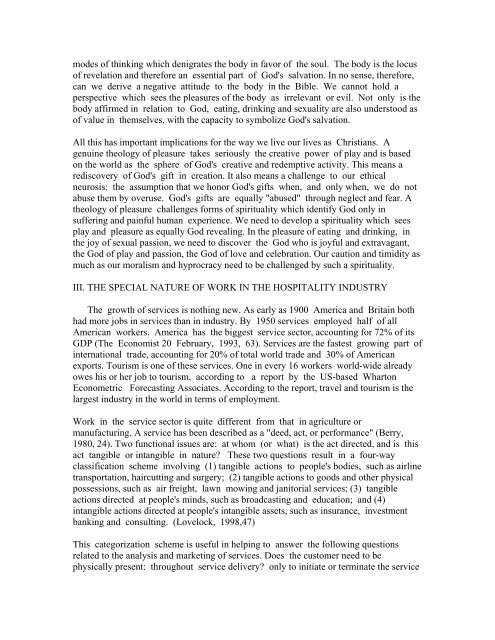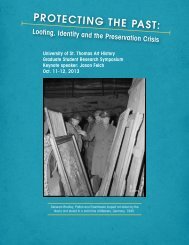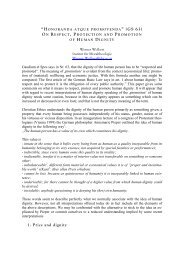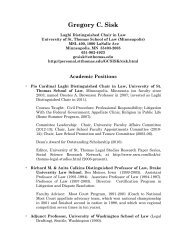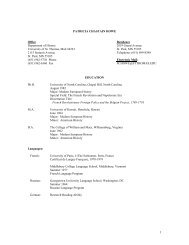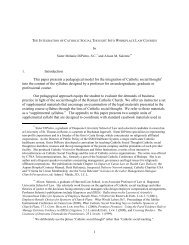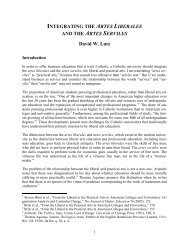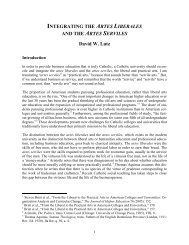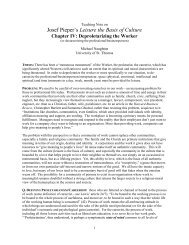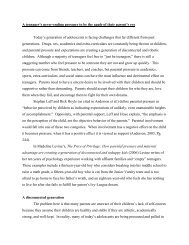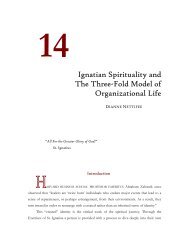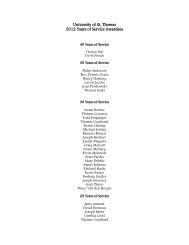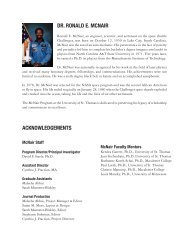Jim Spillane, SJ - University of St. Thomas
Jim Spillane, SJ - University of St. Thomas
Jim Spillane, SJ - University of St. Thomas
Create successful ePaper yourself
Turn your PDF publications into a flip-book with our unique Google optimized e-Paper software.
modes <strong>of</strong> thinking which denigrates the body in favor <strong>of</strong> the soul. The body is the locus<br />
<strong>of</strong> revelation and therefore an essential part <strong>of</strong> God's salvation. In no sense, therefore,<br />
can we derive a negative attitude to the body in the Bible. We cannot hold a<br />
perspective which sees the pleasures <strong>of</strong> the body as irrelevant or evil. Not only is the<br />
body affirmed in relation to God, eating, drinking and sexuality are also understood as<br />
<strong>of</strong> value in themselves, with the capacity to symbolize God's salvation.<br />
All this has important implications for the way we live our lives as Christians. A<br />
genuine theology <strong>of</strong> pleasure takes seriously the creative power <strong>of</strong> play and is based<br />
on the world as the sphere <strong>of</strong> God's creative and redemptive activity. This means a<br />
rediscovery <strong>of</strong> God's gift in creation. It also means a challenge to our ethical<br />
neurosis: the assumption that we honor God's gifts when, and only when, we do not<br />
abuse them by overuse. God's gifts are equally "abused" through neglect and fear. A<br />
theology <strong>of</strong> pleasure challenges forms <strong>of</strong> spirituality which identify God only in<br />
suffering and painful human experience. We need to develop a spirituality which sees<br />
play and pleasure as equally God revealing. In the pleasure <strong>of</strong> eating and drinking, in<br />
the joy <strong>of</strong> sexual passion, we need to discover the God who is joyful and extravagant,<br />
the God <strong>of</strong> play and passion, the God <strong>of</strong> love and celebration. Our caution and timidity as<br />
much as our moralism and hyprocracy need to be challenged by such a spirituality.<br />
III. THE SPECIAL NATURE OF WORK IN THE HOSPITALITY INDUSTRY<br />
The growth <strong>of</strong> services is nothing new. As early as 1900 America and Britain both<br />
had more jobs in services than in industry. By 1950 services employed half <strong>of</strong> all<br />
American workers. America has the biggest service sector, accounting for 72% <strong>of</strong> its<br />
GDP (The Economist 20 February, 1993, 63). Services are the fastest growing part <strong>of</strong><br />
international trade, accounting for 20% <strong>of</strong> total world trade and 30% <strong>of</strong> American<br />
exports. Tourism is one <strong>of</strong> these services. One in every 16 workers world-wide already<br />
owes his or her job to tourism, according to a report by the US-based Wharton<br />
Econometric Forecasting Associates. According to the report, travel and tourism is the<br />
largest industry in the world in terms <strong>of</strong> employment.<br />
Work in the service sector is quite different from that in agriculture or<br />
manufacturing. A service has been described as a "deed, act, or performance" (Berry,<br />
1980, 24). Two functional issues are: at whom (or what) is the act directed, and is this<br />
act tangible or intangible in nature? These two questions result in a four-way<br />
classification scheme involving (1) tangible actions to people's bodies, such as airline<br />
transportation, haircutting and surgery; (2) tangible actions to goods and other physical<br />
possessions, such as air freight, lawn mowing and janitorial services; (3) tangible<br />
actions directed at people's minds, such as broadcasting and education; and (4)<br />
intangible actions directed at people's intangible assets, such as insurance, investment<br />
banking and consulting. (Lovelock, 1998,47)<br />
This categorization scheme is useful in helping to answer the following questions<br />
related to the analysis and marketing <strong>of</strong> services. Does the customer need to be<br />
physically present: throughout service delivery? only to initiate or terminate the service


